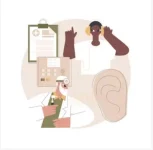
To What Extent Do Genetics Play A Role?
Hearing loss is something that we expect to happen — although we dread it — as we get older. But when your child is born with little to no ability to hear or develop this issue as they get older, the problem could be genetic.
Finding the right solution for hearing loss at any age means understanding the reason behind the problem. When it comes to children, things become a bit more complicated because the cause of the loss could be genetic. Until various tests have been completed and exhausted, genetic hearing loss isn’t always obvious.
Genetics plays a significant role in childhood hearing loss. In fact, when a child loses their hearing early or is born with the issue, the cause is genetic more than half the time. Here, we’ll break down what this means for the child involved.
We talk about genetic hearing loss in children rather than adults because, in almost all cases, someone who has complications with their hearing attributed to their genes will show signs early.
It can be challenging to recognize when a child can’t hear you versus when they’re ignoring you, especially with infants. But over time, you’ll notice little signs that put your parent hackles up when your child doesn’t startle with loud noises or look at you when you call their name.
Children born with reduced or missing hearing abilities or those who develop hearing loss over their childhood usually don’t have other health issues or birth defects. However, this condition is sometimes linked to medical conditions that lead to serious problems with the heart, eyes, or cognitive and physical development.
Another reason it’s difficult for a parent to recognize and accept their child’s potential hearing loss is that it’s not always something that’s passed down. We think of genetics as traits that are shared between generations, like red hair and freckles. But hearing loss doesn’t have to be part of your family tree for it to be hereditary. Your child may be the first one to show the auditory signs of hearing loss.
You know that your child has trouble hearing, and you’ve already been through dozens of tests that were inconclusive, so why dig further? Why not just accept the hearing loss as permanent and avoid getting a diagnosis?
This is the easy route to take, but the most beneficial thing to do in the long run is to get a diagnosis that explains why your child can’t hear. Genetic diagnoses give your child’s doctors the knowledge that may be essential in determining their treatment in the future and predicting any more hearing loss over time.
For your child, understanding why they can’t hear could be vital to their self-esteem as they get older. Importantly, they’ll also need to know if their hearing loss is genetic so that they can determine the likelihood that they will pass it down to their children and grandchildren.
Even if your child is adopted, you can still find out how prevalent hearing loss is in their DNA. Through a simple blood test of no more than three teaspoons of fluid, the laboratory will review the sample to check for genes that are associated with hearing. Within two to three weeks, you should have the results, which can be reviewed at a genetic appointment.
There, your doctor will examine your child, discuss the lab results, and go over any further options for your child’s treatment with you. From there, you may be referred to another specialist to work with you and your child as you decide how to handle the loss of hearing to create the best quality of life possible for your little loved one.






